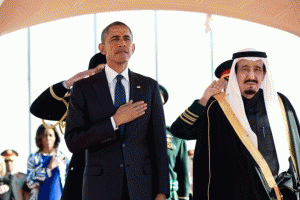Reprinted from Consortium News

President Obama and King Salman Arabia stand at attention during the U.S. national anthem as the First Lady stands in the background with other officials.
(Image by (Official White House Photo by Pete Souza)) Details DMCA
For more than half a century, Saudi Arabia has tried to use its vast oil wealth to build a lobby in the United States that could rival the imposing Israel Lobby. At top dollar, the Saudis hired law firms and PR specialists -- and exploited personal connections to powerful families like the Bushes -- but the Saudis never could build the kind of grassroots political organization that has given Israel and its American backers such extraordinary clout.
Indeed, Americans who did take Saudi money -- including academic institutions and non-governmental organizations -- were often pilloried as tools of the Arabs, with the Israel Lobby and its propagandists raising the political cost of accepting Saudi largesse so high that many people and institutions shied away.
According to a source briefed by U.S. intelligence analysts, the Saudis have given Israel at least $16 billion over the past two years, funneling the money through a third-country Arab state and into an Israeli "development" account in Europe to help finance infrastructure inside Israel. The source first called the account "a Netanyahu slush fund," but later refined that characterization, saying the money was used for public projects such as building settlements in the West Bank.
In other words, according to this information, the Saudis concluded that if you can't beat the Israel Lobby, try buying it. And, if that is the case, the Saudis have found their behind-the-scenes collaboration with Israel extremely valuable. Netanyahu has played a key role in lining up the U.S. Congress to fight an international agreement to resolve a long-running dispute over Iran's nuclear program.
Urged on by Netanyahu, the Republican majority and many Democrats have committed themselves to destroying the framework agreement hammered out on April 2 by Iran and six world powers, including the United States. The deal would impose strict inspections and other limits to guarantee that Iran's nuclear program remains peaceful.
By crashing the deal, Israel and Saudi Arabia would open the door to more punitive sanctions on Iran and possibly clear the way for Israeli airstrikes, with Saudi Arabia granting over-flight permission to Israeli warplanes. The Saudi-Israeli tandem also might hope to pull in the U.S. military to inflict even more devastation on Iranian targets.
Neither the Israeli nor Saudi governments responded to requests for comment on Saudi payments into an Israeli account.
Congressional Acclaim
The reported Saudi-to-Israel money transfers put Netanyahu's March 3 speech to a cheering joint session of the U.S. Congress in a different light, too. The Prime Minister's bitter denunciations of Iran before hundreds of transfixed American lawmakers could be viewed as him demonstrating his value to the Saudi royals who could never dream of getting that kind of reaction themselves.
Indeed, as Congress now moves to sabotage the Iranian nuclear agreement, the Saudis could be finding that whatever money they invested in Israel is money well spent. The Saudis seem especially alarmed that the nuclear agreement would prompt the world community to lift sanctions on Iran, thus allowing its economy -- and its influence -- to grow.
To prevent that, the Saudis desperately want to draw the United States in on the Sunni side of the historic Sunni-Shiite conflict, with Netanyahu serving as a crucial middleman by defying President Barack Obama on the Iran deal and bringing the full force of the Israel Lobby to bear on Congress and on the opinion circles of Official Washington.
If Netanyahu and the Saudis succeed in collapsing the Iran nuclear framework agreement, they will have made great strides toward enlisting the United States as the primary military force on the Sunni side of the Sunni-Shiite sectarian divide, a dispute that dates back to the succession struggle after Prophet Muhammad's death in 632.
This ancient feud has become a Saudi obsession over the past several decades, at least since Iran's Shiite revolution overthrew the Shah of Iran in 1979 and brought to power the Islamic government of Ayatollah Ruhollah Khomeini.
Upset with the ouster of a fellow monarch, the Shah, and fearing the spread of Khomeini's ascetic form of Shiite Islamic governance, the Saudi royals summoned Iraqi dictator Saddam Hussein, a fellow Sunni, to Riyadh on Aug. 5, 1980, to encourage him to invade Iran.
According to top secret "Talking Points" that Secretary of State Alexander Haig prepared for a briefing of President Ronald Reagan after Haig's April 1981 trip to the Middle East, Haig wrote that Saudi Prince Fahd said he told the Iraqis that an invasion of Iran would have U.S. support.
(Note: You can view every article as one long page if you sign up as an Advocate Member, or higher).





